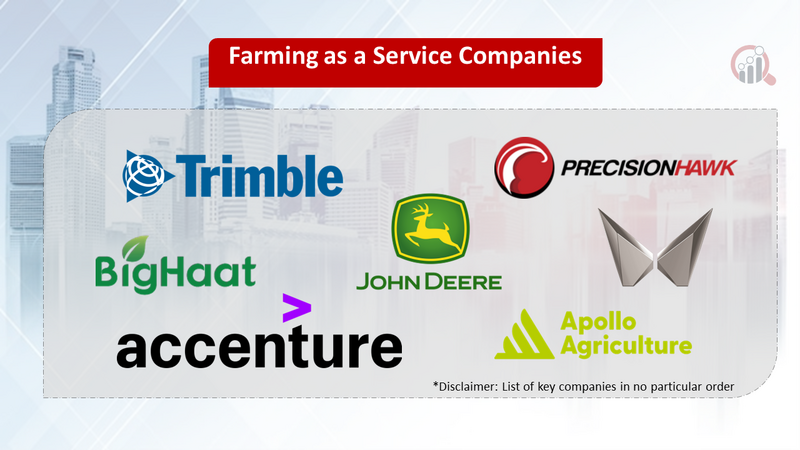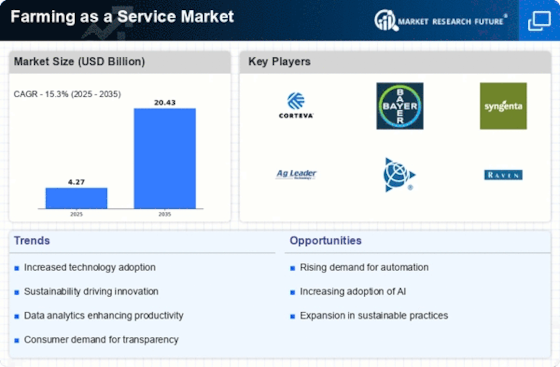Top Industry Leaders in the Farming as a Service Market

Competitive Landscape of the Farming as a Service (FaaS) Market: A Booming Field
The Farming as a Service (FaaS) market is experiencing explosive growth, driven by factors like rising urbanization, increasing demand for sustainable food production, and technological advancements in precision agriculture. This dynamic landscape is home to a diverse range of players, each vying for a slice of the pie. Let's delve into the competitive landscape of the FaaS market, exploring key players, strategies, and emerging trends.
Key Players:
- Apollo Agriculture
- Accenture
- Mahindra & Mahindra Ltd.
- Precision Hawk
- Deere & Company
- Taranis
- 63Ideas Infolabs Private Limited
- Trimble Inc.
- SGS Société Générale de Surveillance SA
- BigHaat.com
Strategies Adopted by Players:
-
Specialization: Players are focusing on specific niches within the FaaS market, catering to the unique needs of different farmer segments (e.g., organic farming, precision agriculture for small farms). -
Partnerships and Collaborations: Strategic partnerships and collaborations are common, allowing players to combine their expertise and resources to offer comprehensive FaaS solutions. -
Subscription-Based Models: Recurring revenue models are gaining traction, with players offering subscription services for access to software, hardware, and data analytics. -
Data-Driven Insights: Leveraging data and analytics is crucial for providing farmers with actionable insights and optimizing farm operations.
Factors for Market Share Analysis:
-
Geographical Reach: Presence in key agricultural regions and the ability to cater to diverse farming practices are crucial for market share growth. -
Technology Innovation: Continuous investment in R&D and development of cutting-edge FaaS solutions is essential for staying ahead of the competition. -
Pricing and Affordability: Offering competitive pricing models and flexible payment options is key to attracting cost-conscious farmers. -
Customer Relationships: Building strong relationships with farmers and understanding their specific needs is paramount for long-term success.
New and Emerging Companies:
-
Vertical Farming Companies: Companies like Vertical Greens and AeroFarms are revolutionizing urban agriculture with their controlled-environment vertical farming systems. -
Blockchain-Based Platforms: Startups like AgriTech and FoodCoin are exploring blockchain technology for traceability, transparency, and fair pricing in the agricultural supply chain. -
Biotechnology Companies: Companies like Memphis Meats and Perfect Day are developing alternative protein sources like cultured meat and plant-based dairy, potentially impacting the future of FaaS offerings.
Current Investment Trends:
-
Venture Capital: VC firms are increasingly investing in FaaS startups, recognizing the market's potential for growth and disruption. -
Private Equity: PE firms are also showing interest in the FaaS market, seeking to acquire established players and consolidate market share. -
Government Initiatives: Governments worldwide are investing in FaaS technologies to promote sustainable agriculture and improve food security.
Latest Company Updates:
-
January 12, 2024: Drone-based crop monitoring systems gain traction for improving efficiency and reducing costs. -
December 5, 2023: The vertical farming segment within FaaS expected to witness the fastest growth due to increasing urban populations and demand for local produce. -
November 25, 2023: Autonomous tractors and robots undergoing field trials, promising increased productivity and reduced labor dependence.










